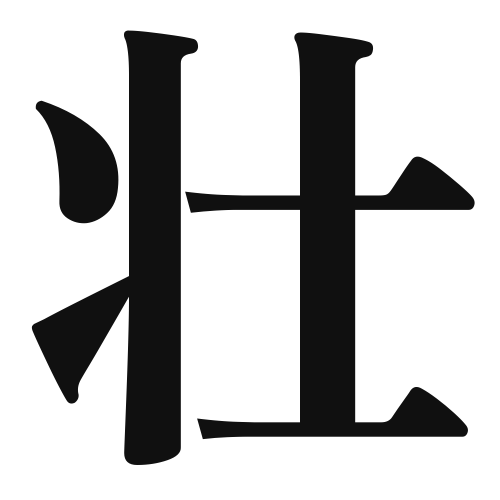1. Overview of Meaning
The kanji “壮” (sō) generally means “magnificent,” “grand,” or “robust.” It conveys a sense of strength and splendor, often used to describe something impressive or powerful.
2. Formation and Radical
Formation of the Kanji: The kanji “壮” is a phonetic-ideographic character (形声文字). It combines the radical for “mountain” (山) which suggests height and grandeur, with the phonetic component “壮” which contributes to its pronunciation.
Radical: The radical of “壮” is 山 (yama), meaning “mountain,” which symbolizes strength and majesty.
3. Examples of Usage
Common Words and Phrases: Some frequently used words that include “壮” are 壮大 (sōdai – grand, magnificent) and 壮観 (sōkan – spectacular view).
Example Sentences in Daily Conversation:
- この山は壮大な景色を提供しています。 (Kono yama wa sōdai na keshiki o teikyō shiteimasu.) – This mountain offers a magnificent view.
- 彼の壮健な体は、毎日の運動の成果です。 (Kare no sōken na karada wa, mainichi no undō no seika desu.) – His robust body is the result of daily exercise.
4. Synonyms and Antonyms
Similar Kanji: A similar kanji is “強” (kyō), which means “strong.” While both convey strength, “壮” emphasizes grandeur and magnificence, whereas “強” focuses more on physical strength or power.
Opposite Kanji: An antonym is “弱” (jaku), meaning “weak.” This kanji represents a lack of strength or robustness, contrasting with the powerful connotation of “壮.”
5. Cultural and Historical Background
Relation to Japanese Culture: The concept of “壮” is often associated with nature and the beauty of landscapes in Japan, reflecting the country’s appreciation for grand and majestic scenery.
Proverbs and Idioms: One common saying is “壮大な夢を持つ” (sōdai na yume o motsu), which means “to have grand dreams,” encouraging people to aspire to greatness.
